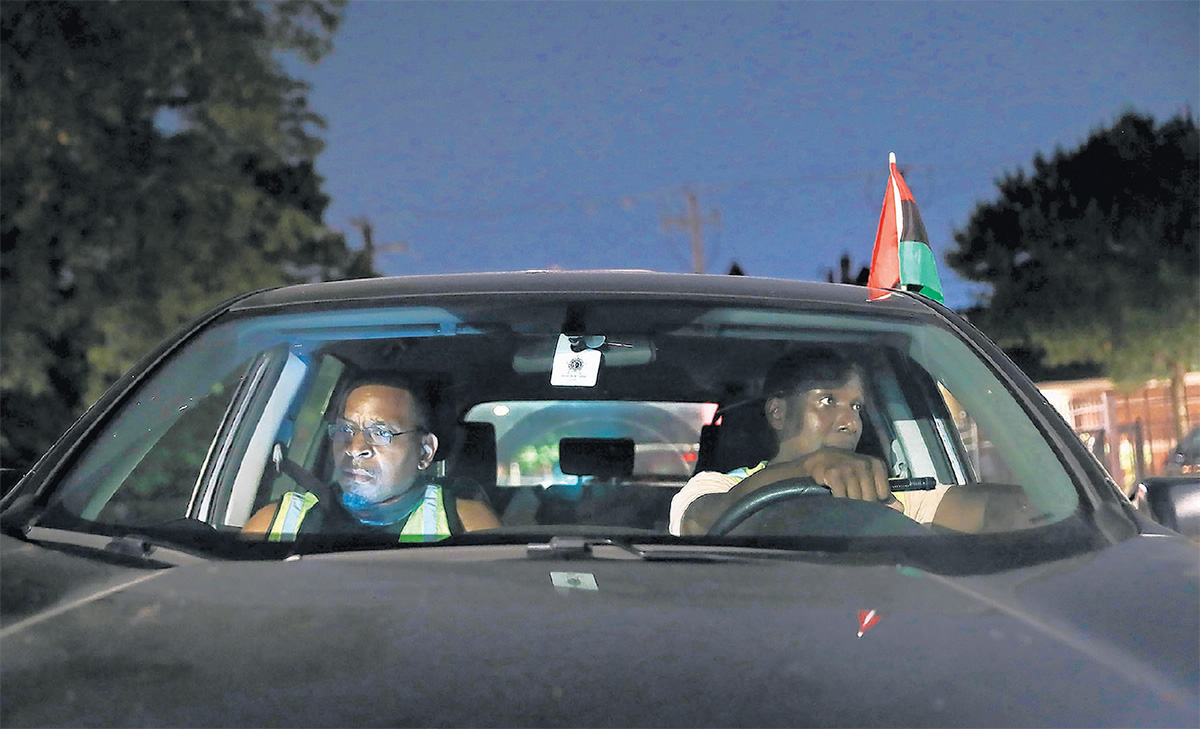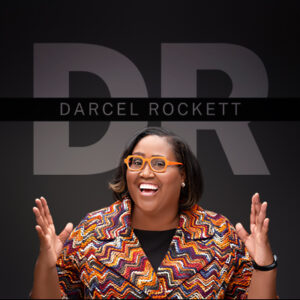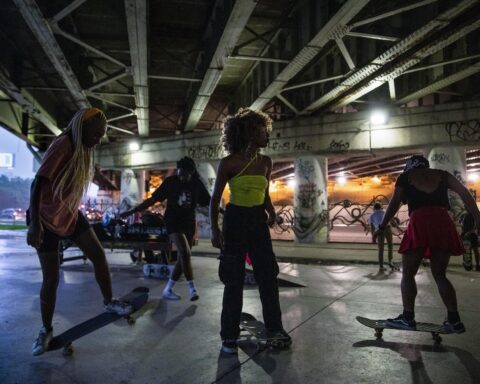What do you do after an eight-hour day of work? Grab dinner, spend time with family and friends before you do it over again? Look toward weekends as time to sleep late, disengage a bit?
Not members of Watch Guard.
On any given night, several men gather outside the Garvey Center, the coach house behind the Lu and Jorja Palmer mansion in Bronzeville, to touch base with one another before they get in their vehicles to patrol the neighborhood from 9 p.m. to 1 a.m., seven days a week (depending on schedules).
Watch Guard volunteers spend their nights looking for trouble—not the kind to get into, but the kind to intercede in to de-escalate.
Co-founders Marquinn McDonald (known as “Q”) and Fambilikile Xhen Nozakhere (known as “FX”) saw something not right in their community, and they’re doing something about it. They’ve been at it since May 31, 2020. If you’ve seen an RBG flag waving from a car window as it drives through Bronzeville—that’s the red, black, and green Pan-African flag, not a Ruth Bader Ginsburg one—odds are members of Watch Guard just passed by.
McDonald, proprietor of Quantum Martial Arts and Fitness, teaches martial arts in the South Loop during the day. When he arrives home, he eats, makes sure the babies are in bed, kisses his wife, and by 8:30 or 8:45 p.m. he’s in the car, ready to patrol.
“We go out, monitor police activity, the community,” McDonald said of the group, formerly known as the Bronzeville Community Patrol. “We watch anything that may be strange going on and do our best to de-escalate things, report and document.”
The neighborhood watch group comprises Black men, as young as 22, who seek to thwart violence in their community. They do that by driving the streets at about 25 mph while listening to the Citizen crime alerting app, the Zello app to communicate with one another while patrolling, and walkie-talkie scanners to listen to police radio transmissions. Comments from community members are followed up on by the group.
McDonald and Nozakhere drive down alleys, past porches, past parked cars and do a turn through the Amber Inn parking lot with eyes peeled. They pull out flashlights to check vacant lots and make sure there’s nothing unusual. They check gate locks on dead-end streets adjacent to a community garden and drive by a bar at Pier 31, knowing it would be closing soon to make sure nothing untoward happens. Businesses, parks, and community organizations all get the same attention. One summer night, Nozakhere tells McDonald to go around a block one more time because he spotted an open car door with no people around. The second time around, we see a person in the car, just with the seats lowered.
“We’re a more assertive neighborhood watch, but what we do is very easy, very simple,” Nozakhere said. “It’s just presence; presence matters. We don’t have cowls and capes.”
While the patrolling is serious, humor does find its way into the car, when Batman and Bruce Wayne come up.
“Sometimes people will say to me: ‘You’re out here like Batman, huh?’ We’re not,” McDonald said. “I love Batman, but at the same time I have a love/hate relationship with him because I think Bruce Wayne could do so much better with his money.”
“Oh, here we go,” Nozakhere said. “With the Wayne Foundation, he’s given money and he’s helped Mr. Freeze a bunch of times. Gotham is filled with psychos and serial killers.”
“Arkham Asylum is known to be terrible,” McDonald said. “It cannot hold anybody, but they keep putting villains in there, and when they break out Batman beats mentally ill patients to a pulp … and puts them back into the mental health facility that can’t supply them with the resources they need. And they’re just going to escape again so he can beat them again?”
When not talking favorite movies (“Big Trouble in Little China”), McDonald is talking village. Because that’s Watch Guard’s purpose, McDonald said: to bring the concept of village back into the community.
“All we got is neighborhoods full of strangers,” he said. “Because of that division, infections set in, and now you got cancers all in the neighborhoods and you got trauma in the community.
“The criminal element can set up shop on your block and not have to worry about you … to push them off the block. We did this because enough is enough. We got to get back to village.
“We all have families, we have children. You should feel comfortable walking up and down the street, no matter the time of day. You, as a Black woman, need to feel protected. You should know I got people watching my back.”
On Saturdays, volunteers are present at area gas stations from late mornings to early afternoons to prevent carjackings. Being of service is the norm, according to McDonald, and people have called Watch Guard volunteers when an apartment in their building was broken into and the police were a long time coming. Watch Guard was there within 20 minutes.
Lydia Magras, a Bronzeville resident, called McDonald this summer because she couldn’t get her 99-year-old mom and her wheelchair down to the ground floor of the building without assistance. The pair were living in a South Shore walk-up at the time. Watch Guard got the mom down on the ground and transported her to the doctor’s office after her Uber was canceled.
Nozakhere admits the group is not 911 for Black folks, but the group also doesn’t deter people from calling them. Instead, McDonald says, if people call us, call the police as well.
“We are not the police,” McDonald said. “We are a part of the community, a part of the village. We’re here to bring resources and to de-escalate, that’s it. We’re trying to figure out ways of actual healing.”
Healing for McDonald means showing up to do the work.
“You got to actually put boots on the ground and engage with people—that’s what Q and his team are doing: engaging with the young people, older people,” Magras said. “As people in the community talk about the violence, Q and his group are an example of actually doing, providing the service that we in the community say we need.”
It’s not the first community patrol group in existence, and Watch Guard volunteers recognize they are not the be-all and end-all for what ails the community. But with an “all hands on deck” mentality to stop violence in the city, they believe they have a role to play.
It’s a role to which Tamar Manasseh, founder of Mothers/Men Against Senseless Killings (MASK), can relate. She’s been on the corner of 75th Street and South Stewart Avenue in Englewood for years in hopes that her presence and that of MASK volunteers will slow the violence. McDonald and other members have helped MASK in the past and helped Manasseh with her ongoing sit-in against violence.
Manasseh sees what McDonald is doing with Watch Guard and feels good about it. She remembers doing community patrols from 4-9 p.m. when MASK began.
“We need more people out on their porches, more eyes on the street,” she said. “No one wants to shoot anybody when somebody is watching.
“That’s the great thing about being present—just people being present is a deterrent. We can’t give up on our community because if we do, we give up on ourselves. I completely support everything he’s doing.”
The disconnect that exists among neighbors with lack of communication has made it difficult to pass down a foundation of knowledge to younger generations, according to McDonald. This summer, the community patrol group mentored dozens of young men aged 13 to 24 for six weeks on Black culture, finance and martial arts. A clinician helped with the young men’s emotional awareness. McDonald had them meditating and performing breathing and visualization exercises during martial arts practice.
“We want to connect them to their culture, to their community, so they feel the responsibility that we do and they get involved in the way that we are,” McDonald said. “And give them head starts that we didn’t have.”
Besides patrolling, Watch Guard’s resources entail giving volunteers:
Knowledge of first-aid response for shooting victims through Ujimaa Medics or UMedics;
Self-defense lessons (with grappling and standing pummeling drills) in case volunteers have to defend themselves during their patrols (“situational awareness is key”);
And learning de-escalation techniques to aid those having a mental health crisis. Flyers with information about crisis triage centers in the city will be provided to people with whom members come in contact.
McDonald invites the community to attend UMedics and self-defense classes at no cost. Crisis intervention is taught by a licensed clinician, also a Watch Guard member.
“If we ever needed to defend ourselves, we know how to do it proficiently without hurting someone or hurting ourselves,” McDonald said. “The goal is to continue the training.
“We need to make sure that we’re staying sharp, revisit previous training, make sure that we’re on point so we can give the best service we can to the community. And to ourselves because we counsel each other, we back each other, we look out for one another. We just want to make sure we can give the best that we can.”
When a call of multiple shots fired in the 3600 block of Giles Avenue, blocks away from the Garvey Center, comes across the police scanner, the members are ready.
“Y’all over there yet?” McDonald asked other Watch Guard members over his walkie-talkie. “We’re gonna go ahead and make that run over there, over.”
Nozakhere and McDonald get to the scene where several police cars and a fire truck have their lights going. Police are moving around and a few residents are on the street, but McDonald walks on the scene with a flashlight and his yellow Watch Guard vest looking for bullet shell casings. He spots a few casings and points them out to law enforcement right before the yellow caution tape goes up.
Less than 15 minutes outside of the patrol car, the Watch Guard co-founders are back in the car reporting back to the other members. Before the night is over, the men will come together in front of the Garvey Center to debrief.
“I’ve been on several crime scenes,” McDonald said. “We are there for everybody to make sure that police are cool, citizens are cool, neighborhood is cool. That’s what we’re there for.
“I’m happy to do what we do, but I’m angry that it has to be done. This isn’t about us taking sides. This is us looking out for ourselves and our neighborhood … that’s where violence prevention begins.”
Officer Watson (who declined to use his first name), a longtime friend of McDonald’s, attests to McDonald’s commitment to bringing the community together in safety.
“Q is one of those qualified voices because he’s been out there when there’s gunshots, where Watch Guard has been a deterrent or eyes and ears for the police,” said Watson. “He’s come to volunteer and brought the Watch Guard guys to help get kids with court-involved services.
“He’s not only taking care of his block, he’s going to multiple blocks, making the effort. What would that picture look like if there were more Q’s? It’s admirable what he’s attempting to do because it’s an uphill battle.
“This battle and climate, I equate it to climbing an icy pole with oily hands—that’s the challenge that he’s got right now.”
Nozakhere, an author, has been living in Bronzeville since 2016. While he says most days he’s scared to death of going out to patrol, he doesn’t let fear dictate his decision. He dons his late father’s bulletproof vest and makes the rounds when his schedule permits.
“My father was a cop and this is the area he patrolled,” Nozakhere said. “It’s ironic that his son is doing the same thing. It’s like I’m picking up the mantle.”
Gardis Watts is a cousin of Brian Gorman, and both are Watch Guard volunteers. Watts, a South Holland resident, is undergoing training in hopes of forming a Watch Guard in the south suburbs, specifically Harvey.
“We have other areas like Dolton, Markham who may need this program as well,” Gorman said. “If they see this, and accept this, we could start something over there.”
Patrol participants are working on a manual that others can use to create community patrols in their own neighborhoods.
“You want to do it on the North Side? Here you go, free of charge, go and be prosperous,” McDonald said. “We’ve been out patrolling every night for a year, so we’ve seen it, we’ve heard it, we’ve experienced it. We’ve de-escalated and prevented, but it is not enough.
“Just like Kim Foxx is not the answer, the city is not the answer. We all are the answer. … It has to be a collective effort.”







